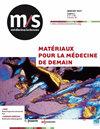2024年诺贝尔化学奖:大卫·贝克、戴米斯·哈萨比斯和约翰·m·跳普。人工智能在结构生物学中的革命]。
IF 0.4
4区 医学
Q4 MEDICINE, RESEARCH & EXPERIMENTAL
引用次数: 0
摘要
2024年诺贝尔化学奖被授予Demis Hassabis和John M. Jumper (b谷歌DeepMind),以表彰他们在人工智能指导下的蛋白质结构预测方面的发展,以及David Baker(美国华盛顿大学西雅图分校)在计算蛋白质设计方面的发展。这一事件标志着结构生物学领域的一场革命,它导致了一个包含近2亿个预测蛋白质结构的文库的产生,旨在加速研究。人工智能的这场革命也导致了本综述中提出的几种具有医学意义的人工蛋白质的设计。本文章由计算机程序翻译,如有差异,请以英文原文为准。
[Nobel Prize in chemistry 2024: David Baker, Demis Hassabis et John M. Jumper. The revolution of artificial intelligence in structural biology].
The 2024 Nobel Prize in chemistry has been awarded to Demis Hassabis and John M. Jumper (Google DeepMind) for the development of artificial intelligence-guided protein structure prediction and to David Baker (University of Washington, Seattle, USA) for the development of computational protein design. This event marks a revolution in the field of structural biology that has led, among other things, to the generation of a library of nearly 200 million predicted protein structures designed to speed up research. This revolution in AI has also led to the design of several artificial proteins of medical interest presented in this review.
求助全文
通过发布文献求助,成功后即可免费获取论文全文。
去求助
来源期刊

M S-medecine Sciences
医学-医学:研究与实验
CiteScore
0.80
自引率
14.30%
发文量
182
审稿时长
4-8 weeks
期刊介绍:
m/s offers high-quality review articles in French, covering all areas of biomedical and health research, in a monthly magazine format (10 issues / year). m/s is read by the whole French-speaking community, in France but also in Belgium, Switzerland, Canada, Morocco, Algeria, Tunisia etc. m/s is not a primary publication, and thus will not consider unpublished data. Most articles are invited by the Editors, but spontaneous proposals are welcomed. Each issue combines news and views on the most recent scientific publications, as well as broadly accessible and updated review articles on a specific topic, and essays on science and society, history of science, public health, or reactions to published articles. Each year, m/s also publishes one or two thematic issues focused on a research topic of high interest. All review articles and essays are peer-reviewed.
 求助内容:
求助内容: 应助结果提醒方式:
应助结果提醒方式:


